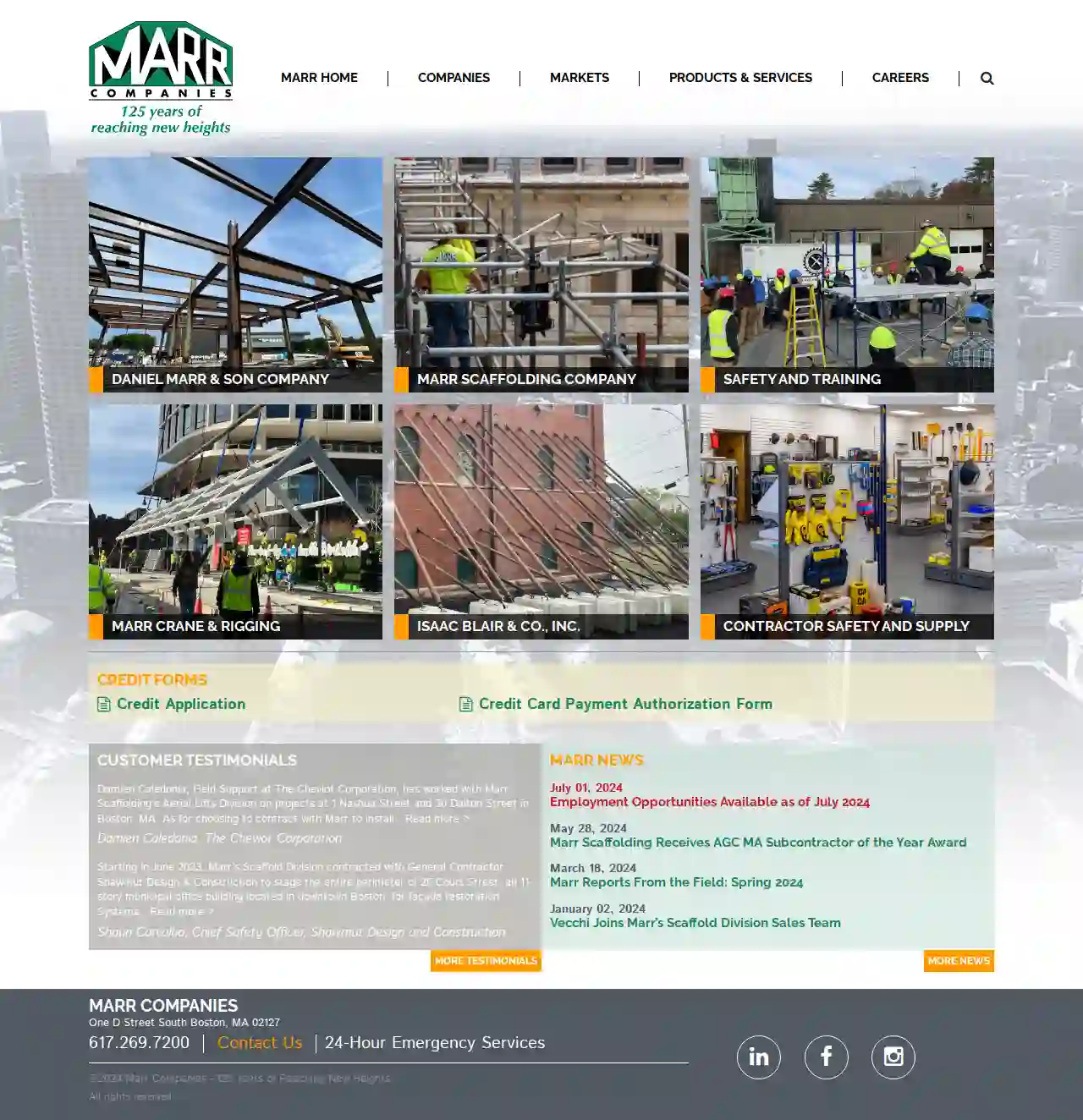Scaffolding Companies Warren
Find top Scaffolding Builders in Warren
Get multiple Scaffolding Companies quotes for your project today! Compare profiles, reviews, accreditations, portfolio, etc... and choose the best service.

Marr Scaffolding Company - Providence
44 reviewsOne D Street South Boston, MA, Boston, 02127, USMarr Companies: A Legacy of Excellence For over 125 years, Marr Companies has been a trusted leader in the construction industry, providing a wide range of services and products to meet the needs of our clients. Our commitment to safety, quality, and customer satisfaction has earned us a reputation for excellence throughout the region. Our Mission Our mission is to provide our clients with the highest quality construction services and products, delivered safely and efficiently. We strive to build lasting relationships with our clients, based on trust, respect, and a shared commitment to excellence. Our Values Our values guide everything we do. We are committed to: Safety First Quality Workmanship Customer Satisfaction Integrity and Ethics Teamwork and Collaboration Our Experience Our team of experienced professionals has a deep understanding of the construction industry and a proven track record of success. We are committed to providing our clients with the best possible service and support, from the initial planning stages to the final completion of the project.
- Services
- Why Us?
- Gallery
Get Quote
Atlas Scaffolding & Equipment
51 reviewsWarwick, RI, 80 Gilbane Street, 02886, USAtlas Scaffolding & Equipment is a full-service scaffolding, shoring, and trash chute equipment rentals, sales, installation, and dismantling services company. Established in 1997, they cater to contractors, municipalities, and industrial customers throughout Rhode Island, Southeastern Massachusetts, and parts of Connecticut. Their main facility is located at 80 Gilbane Street, Warwick, RI. Known for their excellent safety record, quick and responsive service, free estimates, full insurance, strict OSHA compliance, and membership in the SIA, Atlas Scaffolding is a trusted name in the industry.
- Services
- Why Us?
- Accreditations
- Our Team
- Testimonials
- Gallery
Get Quote- Ne
Newport Builders' Supply Co
Providence, US- Services
- Why Us?
Get Quote
Over 2,353+ Scaffolding Businesses onboarded
Our scaffolding companies operate in Warren & beyond!
ScaffoldingHQ has curated and vetted Top Scaffolding Businesses in and around Warren. Find a top & trustworthy contractor today.
Frequently Asked Questions About Scaffolding Companies
- Tube and Clamp Scaffolding: A traditional and versatile system using individual tubes and clamps. It's highly adaptable but requires more time to erect.
- System Scaffolding: Pre-engineered systems with modular components that fit together quickly. They offer speed and efficiency, especially for larger projects.
- Suspended Scaffolding: Hung from a roof or overhead structure, ideal for high-rise buildings or areas with limited ground access.
- Mobile Scaffolding: Mounted on wheels, allowing easy movement around a worksite. Suitable for tasks like painting or plastering.
- Specialized Scaffolding: Cantilever scaffolding, rolling towers, and other specialized systems cater to specific needs.
- Licensing and Insurance: Verify their licenses are current and that they have adequate insurance coverage.
- Experience: Choose a company with a history of successfully completing similar projects. Ask for references and check their portfolio.
- Safety Record: Inquire about their safety practices and accident history. A strong safety culture is essential.
- Professionalism: Observe their communication, responsiveness, and attention to detail. A reputable company will be organized and transparent.
- Reviews and Testimonials: Read online reviews and feedback from previous clients to assess their reputation.
- Industry Affiliations: Membership in professional organizations like the NASC (National Access & Scaffolding Confederation) indicates a commitment to industry standards.
- Encroaches onto public property (sidewalks, roads): Permits are usually needed from the local council or highway authority.
- Exceeds a certain height: Scaffolding above a specified height often requires a permit.
- Is erected in a conservation area or near a listed building: Special considerations and permits may apply.
What are the different types of scaffolding?
How do I know if a scaffolding company is reputable?
Can I erect scaffolding myself?
Do I need a permit for scaffolding in the USA?
What are the different types of scaffolding?
- Tube and Clamp Scaffolding: A traditional and versatile system using individual tubes and clamps. It's highly adaptable but requires more time to erect.
- System Scaffolding: Pre-engineered systems with modular components that fit together quickly. They offer speed and efficiency, especially for larger projects.
- Suspended Scaffolding: Hung from a roof or overhead structure, ideal for high-rise buildings or areas with limited ground access.
- Mobile Scaffolding: Mounted on wheels, allowing easy movement around a worksite. Suitable for tasks like painting or plastering.
- Specialized Scaffolding: Cantilever scaffolding, rolling towers, and other specialized systems cater to specific needs.
How do I know if a scaffolding company is reputable?
- Licensing and Insurance: Verify their licenses are current and that they have adequate insurance coverage.
- Experience: Choose a company with a history of successfully completing similar projects. Ask for references and check their portfolio.
- Safety Record: Inquire about their safety practices and accident history. A strong safety culture is essential.
- Professionalism: Observe their communication, responsiveness, and attention to detail. A reputable company will be organized and transparent.
- Reviews and Testimonials: Read online reviews and feedback from previous clients to assess their reputation.
- Industry Affiliations: Membership in professional organizations like the NASC (National Access & Scaffolding Confederation) indicates a commitment to industry standards.
Can I erect scaffolding myself?
Do I need a permit for scaffolding in the USA?
- Encroaches onto public property (sidewalks, roads): Permits are usually needed from the local council or highway authority.
- Exceeds a certain height: Scaffolding above a specified height often requires a permit.
- Is erected in a conservation area or near a listed building: Special considerations and permits may apply.